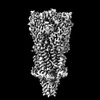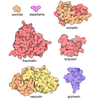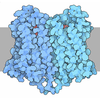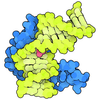[English] 日本語
 Yorodumi
Yorodumi- PDB-8v8c: Alpha7-nicotinic acetylcholine receptor time resolved bound to ep... -
+ Open data
Open data
- Basic information
Basic information
| Entry | Database: PDB / ID: 8v8c | ||||||
|---|---|---|---|---|---|---|---|
| Title | Alpha7-nicotinic acetylcholine receptor time resolved bound to epibatidine and PNU-120596 asymmetric state 1 | ||||||
 Components Components | Neuronal acetylcholine receptor subunit alpha-7,Soluble cytochrome b562 | ||||||
 Keywords Keywords |  MEMBRANE PROTEIN / MEMBRANE PROTEIN /  ION CHANNEL / ION CHANNEL /  NICOTINIC RECEPTOR NICOTINIC RECEPTOR | ||||||
| Function / homology |  Function and homology information Function and homology information sensory processing / dendrite arborization / sensory processing / dendrite arborization /  acetylcholine receptor activity / response to acetylcholine / Highly calcium permeable postsynaptic nicotinic acetylcholine receptors / acetylcholine-gated channel complex / acetylcholine receptor activity / response to acetylcholine / Highly calcium permeable postsynaptic nicotinic acetylcholine receptors / acetylcholine-gated channel complex /  short-term memory / regulation of amyloid fibril formation / acetylcholine-gated monoatomic cation-selective channel activity / positive regulation of CoA-transferase activity ... short-term memory / regulation of amyloid fibril formation / acetylcholine-gated monoatomic cation-selective channel activity / positive regulation of CoA-transferase activity ... sensory processing / dendrite arborization / sensory processing / dendrite arborization /  acetylcholine receptor activity / response to acetylcholine / Highly calcium permeable postsynaptic nicotinic acetylcholine receptors / acetylcholine-gated channel complex / acetylcholine receptor activity / response to acetylcholine / Highly calcium permeable postsynaptic nicotinic acetylcholine receptors / acetylcholine-gated channel complex /  short-term memory / regulation of amyloid fibril formation / acetylcholine-gated monoatomic cation-selective channel activity / positive regulation of CoA-transferase activity / dendritic spine organization / chloride channel regulator activity / short-term memory / regulation of amyloid fibril formation / acetylcholine-gated monoatomic cation-selective channel activity / positive regulation of CoA-transferase activity / dendritic spine organization / chloride channel regulator activity /  acetylcholine binding / regulation of amyloid precursor protein catabolic process / acetylcholine receptor signaling pathway / acetylcholine binding / regulation of amyloid precursor protein catabolic process / acetylcholine receptor signaling pathway /  synaptic transmission, cholinergic / positive regulation of amyloid-beta formation / modulation of excitatory postsynaptic potential / negative regulation of amyloid-beta formation / plasma membrane raft / response to amyloid-beta / positive regulation of excitatory postsynaptic potential / negative regulation of tumor necrosis factor production / synaptic transmission, cholinergic / positive regulation of amyloid-beta formation / modulation of excitatory postsynaptic potential / negative regulation of amyloid-beta formation / plasma membrane raft / response to amyloid-beta / positive regulation of excitatory postsynaptic potential / negative regulation of tumor necrosis factor production /  toxic substance binding / monoatomic ion transport / positive regulation of protein metabolic process / monoatomic ion transmembrane transport / toxic substance binding / monoatomic ion transport / positive regulation of protein metabolic process / monoatomic ion transmembrane transport /  electron transport chain / response to nicotine / positive regulation of long-term synaptic potentiation / synapse organization / electron transport chain / response to nicotine / positive regulation of long-term synaptic potentiation / synapse organization /  calcium channel activity / calcium channel activity /  memory / intracellular calcium ion homeostasis / memory / intracellular calcium ion homeostasis /  cognition / positive regulation of angiogenesis / calcium ion transport / monoatomic ion channel activity / cognition / positive regulation of angiogenesis / calcium ion transport / monoatomic ion channel activity /  amyloid-beta binding / postsynapse / amyloid-beta binding / postsynapse /  postsynaptic membrane / positive regulation of MAPK cascade / postsynaptic membrane / positive regulation of MAPK cascade /  electron transfer activity / electron transfer activity /  periplasmic space / learning or memory / positive regulation of ERK1 and ERK2 cascade / response to hypoxia / neuron projection / positive regulation of protein phosphorylation / iron ion binding / periplasmic space / learning or memory / positive regulation of ERK1 and ERK2 cascade / response to hypoxia / neuron projection / positive regulation of protein phosphorylation / iron ion binding /  synapse / positive regulation of cell population proliferation / synapse / positive regulation of cell population proliferation /  heme binding / heme binding /  signal transduction / protein homodimerization activity / signal transduction / protein homodimerization activity /  membrane / membrane /  plasma membrane plasma membraneSimilarity search - Function | ||||||
| Biological species |   Homo sapiens (human) Homo sapiens (human) | ||||||
| Method |  ELECTRON MICROSCOPY / ELECTRON MICROSCOPY /  single particle reconstruction / single particle reconstruction /  cryo EM / Resolution: 3.29 Å cryo EM / Resolution: 3.29 Å | ||||||
 Authors Authors | Burke, S.M. / Noviello, C.M. / Hibbs, R.E. | ||||||
| Funding support |  United States, 1items United States, 1items
| ||||||
 Citation Citation |  Journal: Cell / Year: 2024 Journal: Cell / Year: 2024Title: Structural mechanisms of α7 nicotinic receptor allosteric modulation and activation. Authors: Sean M Burke / Mariia Avstrikova / Colleen M Noviello / Nuriya Mukhtasimova / Jean-Pierre Changeux / Ganesh A Thakur / Steven M Sine / Marco Cecchini / Ryan E Hibbs /   Abstract: The α7 nicotinic acetylcholine receptor is a pentameric ligand-gated ion channel that plays an important role in cholinergic signaling throughout the nervous system. Its unique physiological ...The α7 nicotinic acetylcholine receptor is a pentameric ligand-gated ion channel that plays an important role in cholinergic signaling throughout the nervous system. Its unique physiological characteristics and implications in neurological disorders and inflammation make it a promising but challenging therapeutic target. Positive allosteric modulators overcome limitations of traditional α7 agonists, but their potentiation mechanisms remain unclear. Here, we present high-resolution structures of α7-modulator complexes, revealing partially overlapping binding sites but varying conformational states. Structure-guided functional and computational tests suggest that differences in modulator activity arise from the stable rotation of a channel gating residue out of the pore. We extend the study using a time-resolved cryoelectron microscopy (cryo-EM) approach to reveal asymmetric state transitions for this homomeric channel and also find that a modulator with allosteric agonist activity exploits a distinct channel-gating mechanism. These results define mechanisms of α7 allosteric modulation and activation with implications across the pentameric receptor superfamily. | ||||||
| History |
|
- Structure visualization
Structure visualization
| Structure viewer | Molecule:  Molmil Molmil Jmol/JSmol Jmol/JSmol |
|---|
- Downloads & links
Downloads & links
- Download
Download
| PDBx/mmCIF format |  8v8c.cif.gz 8v8c.cif.gz | 654.7 KB | Display |  PDBx/mmCIF format PDBx/mmCIF format |
|---|---|---|---|---|
| PDB format |  pdb8v8c.ent.gz pdb8v8c.ent.gz | 545.6 KB | Display |  PDB format PDB format |
| PDBx/mmJSON format |  8v8c.json.gz 8v8c.json.gz | Tree view |  PDBx/mmJSON format PDBx/mmJSON format | |
| Others |  Other downloads Other downloads |
-Validation report
| Arichive directory |  https://data.pdbj.org/pub/pdb/validation_reports/v8/8v8c https://data.pdbj.org/pub/pdb/validation_reports/v8/8v8c ftp://data.pdbj.org/pub/pdb/validation_reports/v8/8v8c ftp://data.pdbj.org/pub/pdb/validation_reports/v8/8v8c | HTTPS FTP |
|---|
-Related structure data
| Related structure data |  43034MC  8ut1C  8utbC  8uzjC  8v80C  8v82C  8v86C  8v88C  8v89C  8v8aC  8v8dC C: citing same article ( M: map data used to model this data |
|---|---|
| Similar structure data | Similarity search - Function & homology  F&H Search F&H Search |
- Links
Links
- Assembly
Assembly
| Deposited unit | 
|
|---|---|
| 1 |
|
- Components
Components
-Protein , 1 types, 5 molecules ABCDE
| #1: Protein | Mass: 67220.797 Da / Num. of mol.: 5 Source method: isolated from a genetically manipulated source Details: 351-353 (linker) 354-460 (SOLUBLE CYTOCHROME B562 FUSION) 551-558 (strep tag II) 559-571 (linker) 572-579 (strep tag II) 580-582 (linker) 583-599 (T2A self cleaving peptide post cleavage) ...Details: 351-353 (linker) 354-460 (SOLUBLE CYTOCHROME B562 FUSION) 551-558 (strep tag II) 559-571 (linker) 572-579 (strep tag II) 580-582 (linker) 583-599 (T2A self cleaving peptide post cleavage),351-353 (linker) 354-460 (SOLUBLE CYTOCHROME B562 FUSION) 551-558 (strep tag II) 559-571 (linker) 572-579 (strep tag II) 580-582 (linker) 583-599 (T2A self cleaving peptide post cleavage),351-353 (linker) 354-460 (SOLUBLE CYTOCHROME B562 FUSION) 551-558 (strep tag II) 559-571 (linker) 572-579 (strep tag II) 580-582 (linker) 583-599 (T2A self cleaving peptide post cleavage),351-353 (linker) 354-460 (SOLUBLE CYTOCHROME B562 FUSION) 551-558 (strep tag II) 559-571 (linker) 572-579 (strep tag II) 580-582 (linker) 583-599 (T2A self cleaving peptide post cleavage),351-353 (linker) 354-460 (SOLUBLE CYTOCHROME B562 FUSION) 551-558 (strep tag II) 559-571 (linker) 572-579 (strep tag II) 580-582 (linker) 583-599 (T2A self cleaving peptide post cleavage),351-353 (linker) 354-460 (SOLUBLE CYTOCHROME B562 FUSION) 551-558 (strep tag II) 559-571 (linker) 572-579 (strep tag II) 580-582 (linker) 583-599 (T2A self cleaving peptide post cleavage),351-353 (linker) 354-460 (SOLUBLE CYTOCHROME B562 FUSION) 551-558 (strep tag II) 559-571 (linker) 572-579 (strep tag II) 580-582 (linker) 583-599 (T2A self cleaving peptide post cleavage),351-353 (linker) 354-460 (SOLUBLE CYTOCHROME B562 FUSION) 551-558 (strep tag II) 559-571 (linker) 572-579 (strep tag II) 580-582 (linker) 583-599 (T2A self cleaving peptide post cleavage),351-353 (linker) 354-460 (SOLUBLE CYTOCHROME B562 FUSION) 551-558 (strep tag II) 559-571 (linker) 572-579 (strep tag II) 580-582 (linker) 583-599 (T2A self cleaving peptide post cleavage) Source: (gene. exp.)   Homo sapiens (human) / Gene: CHRNA7, NACHRA7, cybC / Production host: Homo sapiens (human) / Gene: CHRNA7, NACHRA7, cybC / Production host:   Homo sapiens (human) / References: UniProt: P36544, UniProt: P0ABE7 Homo sapiens (human) / References: UniProt: P36544, UniProt: P0ABE7 |
|---|
-Sugars , 2 types, 15 molecules 
| #2: Polysaccharide | 2-acetamido-2-deoxy-beta-D-glucopyranose-(1-4)-2-acetamido-2-deoxy-beta-D-glucopyranose  / Mass: 424.401 Da / Num. of mol.: 5 / Mass: 424.401 Da / Num. of mol.: 5Source method: isolated from a genetically manipulated source #3: Sugar | ChemComp-NAG /  N-Acetylglucosamine N-Acetylglucosamine |
|---|
-Non-polymers , 3 types, 13 molecules 




| #4: Chemical | ChemComp-EPJ /  Epibatidine Epibatidine#5: Chemical | ChemComp-I34 /  PNU-120,596 PNU-120,596#6: Chemical | |
|---|
-Details
| Has ligand of interest | Y |
|---|
-Experimental details
-Experiment
| Experiment | Method:  ELECTRON MICROSCOPY ELECTRON MICROSCOPY |
|---|---|
| EM experiment | Aggregation state: PARTICLE / 3D reconstruction method:  single particle reconstruction single particle reconstruction |
- Sample preparation
Sample preparation
| Component | Name: Alpha7-nicotinic acetylcholine receptor time resolved bound to epibatidine and PNU-120596 asymmetric state 1 Type: COMPLEX / Entity ID: #1 / Source: RECOMBINANT |
|---|---|
| Source (natural) | Organism:   Homo sapiens (human) Homo sapiens (human) |
| Source (recombinant) | Organism:   Homo sapiens (human) Homo sapiens (human) |
| Buffer solution | pH: 7.4 |
| Specimen | Conc.: 6.5 mg/ml / Embedding applied: NO / Shadowing applied: NO / Staining applied : NO / Vitrification applied : NO / Vitrification applied : YES : YES |
Vitrification | Cryogen name: ETHANE |
- Electron microscopy imaging
Electron microscopy imaging
| Experimental equipment |  Model: Titan Krios / Image courtesy: FEI Company |
|---|---|
| Microscopy | Model: FEI TITAN KRIOS |
| Electron gun | Electron source : :  FIELD EMISSION GUN / Accelerating voltage: 300 kV / Illumination mode: FLOOD BEAM FIELD EMISSION GUN / Accelerating voltage: 300 kV / Illumination mode: FLOOD BEAM |
| Electron lens | Mode: BRIGHT FIELD Bright-field microscopy / Nominal defocus max: 2000 nm / Nominal defocus min: 500 nm Bright-field microscopy / Nominal defocus max: 2000 nm / Nominal defocus min: 500 nm |
| Image recording | Electron dose: 40 e/Å2 / Film or detector model: GATAN K3 (6k x 4k) |
- Processing
Processing
| EM software |
| ||||||||||||||||||||||||
|---|---|---|---|---|---|---|---|---|---|---|---|---|---|---|---|---|---|---|---|---|---|---|---|---|---|
CTF correction | Type: PHASE FLIPPING AND AMPLITUDE CORRECTION | ||||||||||||||||||||||||
| Symmetry | Point symmetry : C1 (asymmetric) : C1 (asymmetric) | ||||||||||||||||||||||||
3D reconstruction | Resolution: 3.29 Å / Resolution method: FSC 0.143 CUT-OFF / Num. of particles: 30540 / Symmetry type: POINT | ||||||||||||||||||||||||
| Refine LS restraints |
|
 Movie
Movie Controller
Controller












 PDBj
PDBj











